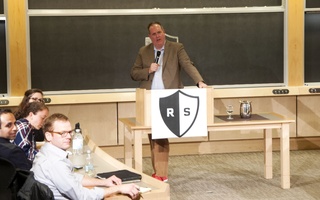{shortcode-8bfd85d573773b94dd4fbd8d608c61461e6e2c65}When Stephanie Dufresne ’20 was in Venice, Italy this summer on one of Harvard’s study abroad programs, she did her best to blend in with Italian locals around her. Not only did she not want to look like a tourist, she also didn’t want people to realize that she is an American.
Never the most popular on the European continent, Americans have, in the last year, faced additional stigma in their travels abroad: Donald Trump is the president of their country. Trump is widely disliked across the globe, a fact of life that Dufresne frequently confronted.
“They thought he was ignorant and saw his presidency as somewhat of a joke,” Dufresne said. “Even before Trump was president, there were already negative stereotypes that made Americans seem rude and cocky, so now I think you can see more of these stereotypes playing out with Trump actually as president.”
Still, Dufresne said that many of the Italians she met this summer understood that the president doesn’t necessarily represent the whole country.
“It did seem like a lot of Italians have similar feelings with people in the North or even most people here at Harvard about Trump, but they still felt bad for Americans like me because Trump is our president,” she said.
Dufresne is one of many Harvard students who have studied abroad in the Trump era, navigating a particularly fraught moment for America’s standing in the world. Trump has enacted a number of policies that Harvard students said prompted questioning and confusion from people they met in countries around the world.
Julia Englebert ’20 studied abroad in Peru, where she immersed herself in archaeological fieldwork. During her free time, Englebert visited various places around Peru, at one point encountering a 9-year old girl at a museum.
“We went from talking about Taylor Swift to politics and she asked me about the president and what I thought about him… She later asked if the US is going to bomb Peru just like it had bombed Syria,” she said.
Englebert said she was baffled by the question.
“I found myself in a very awkward and terrifying situation,” Englebert said. “Honestly, I didn’t know what to say.”
The discussion made Englebert realize that the Trump presidency was shaping how young people all over the world viewed the United States. Still, Englebert said studying abroad has made her appreciate America’s political system despite the negative feelings she has towards its current leader.
“[Studying abroad] made me realize that we are not the only country that struggles with leadership. At the time I was in Peru, the former president of Peru, who was in jail, was getting interviewed for his charges,” Englebert said. “It made me think about how countries all over the world are entrenched in political drama.”
Ryan Lawton ’18, who studied abroad in South Korea this past summer, said South Koreans’ response to Trump was mocking at best. In between conversations, South Korean students passed offhand comments and jokes about not only Trump, but also American politics more generally.
Lawton said he traveled to Korea during a time when South Korea’s political climate was especially contentious after the impeachment of former President Park Geun-hye. However, South Korean students did not shy away from talking about both Korean and American politics.
“They were disillusioned with their government and they seemed to have a fatalist way of talking about politics in general,” Lawton said. “But the Korean students definitely did not judge us [Americans] by our political views and instead seemed to want to engage in a conversation about current events.”
Englebert said the complexity of politics and the anti-American sentiments that various international communities may have should not deter students from studying abroad.
Michelle Kim ’18 echoed this thought. She said studying abroad during term-time in the Netherlands provided her with incredible opportunities and also helped her to better appreciate Harvard when she came back to campus.
“Locals in the Netherlands did not hold Americans responsible for Trump’s actions.” Kim said. “In fact, whatever negative feelings they had seemed to be directed towards Trump himself and not towards the general American people.”
—Staff writer Sonia Kim can be reached at sonia.kim@thecrimson.com.
Read more in News
World Bank CEO Talks Global Poverty Reduction at IOPRecommended Articles
-
 Kennedy School Group Starts 'Resistance School' In Response To Trump Administration
Kennedy School Group Starts 'Resistance School' In Response To Trump Administration -
In Defense of the SouthThe American South is saturated by mostly unfounded negative stereotypes. In a place as vividly conscious of political correctness as Harvard, I didn’t expect those stereotypes to be so blatantly perpetuated.
-
Trump’s Silence on South African Land Reform is a Sign of the TimesIn the bygone ages of Woodrow Wilson or John F. Kennedy ’40, Bill Clinton or Barack Obama, America might have offered some sort of policy or moral guidance. But no longer in the era of President Donald Trump, Twitter tirades, and trade wars.
-
 What a Time to Be American
What a Time to Be American -
 Mass. Candidate Pressley Talks Warren, Sexual Assault at Media Roundtable
Mass. Candidate Pressley Talks Warren, Sexual Assault at Media Roundtable













